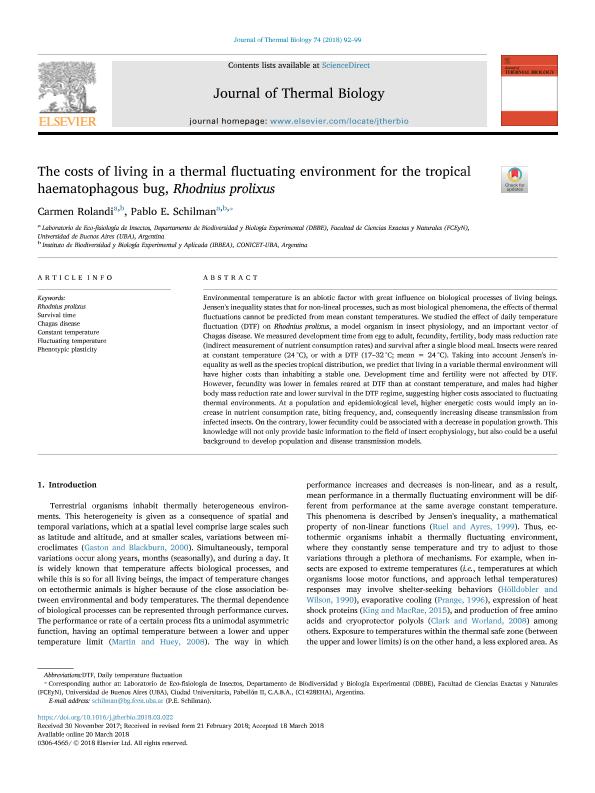Artículo
The costs of living in a thermal fluctuating environment for the tropical haematophagous bug, Rhodnius prolixus
Fecha de publicación:
05/2018
Editorial:
Pergamon-Elsevier Science Ltd
Revista:
Journal of Thermal Biology
ISSN:
0306-4565
Idioma:
Inglés
Tipo de recurso:
Artículo publicado
Clasificación temática:
Resumen
Environmental temperature is an abiotic factor with great influence on biological processes of living beings. Jensen's inequality states that for non-lineal processes, such as most biological phenomena, the effects of thermal fluctuations cannot be predicted from mean constant temperatures. We studied the effect of daily temperature fluctuation (DTF) on Rhodnius prolixus, a model organism in insect physiology, and an important vector of Chagas disease. We measured development time from egg to adult, fecundity, fertility, body mass reduction rate (indirect measurement of nutrient consumption rates) and survival after a single blood meal. Insects were reared at constant temperature (24 °C), or with a DTF (17–32 °C; mean = 24 °C). Taking into account Jensen's inequality as well as the species tropical distribution, we predict that living in a variable thermal environment will have higher costs than inhabiting a stable one. Development time and fertility were not affected by DTF. However, fecundity was lower in females reared at DTF than at constant temperature, and males had higher body mass reduction rate and lower survival in the DTF regime, suggesting higher costs associated to fluctuating thermal environments. At a population and epidemiological level, higher energetic costs would imply an increase in nutrient consumption rate, biting frequency, and, consequently increasing disease transmission from infected insects. On the contrary, lower fecundity could be associated with a decrease in population growth. This knowledge will not only provide basic information to the field of insect ecophysiology, but also could be a useful background to develop population and disease transmission models.
Archivos asociados
Licencia
Identificadores
Colecciones
Articulos(IBBEA)
Articulos de INSTITUTO DE BIODIVERSIDAD Y BIOLOGIA EXPERIMENTAL Y APLICADA
Articulos de INSTITUTO DE BIODIVERSIDAD Y BIOLOGIA EXPERIMENTAL Y APLICADA
Citación
Rolandi, Carmen; Schilman, Pablo Ernesto; The costs of living in a thermal fluctuating environment for the tropical haematophagous bug, Rhodnius prolixus; Pergamon-Elsevier Science Ltd; Journal of Thermal Biology; 74; 5-2018; 92-99
Compartir
Altmétricas




